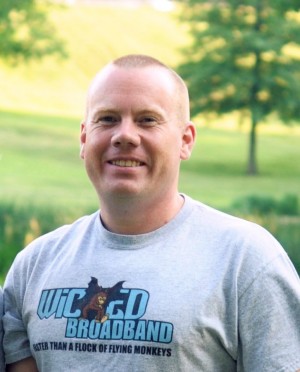
There are probably many reasons that US households have so few choices for Internet service, but not least among them is the fact that starting a new ISP is really difficult, and expensive to boot.
Millions of Americans would gladly switch from their DSL or cable Internet service to fiber, which in many cities delivers speeds of 1Gbps. That's 250 times faster than the 4Mbps download bandwidth that qualifies as "broadband" under the Federal Communications Commission definition. As of Dec. 2012, 29 percent of US households lived in census tracts with one or zero providers offering fixed Internet service of at least 6Mbps, according to FCC data. While the other 71 percent of census tracts had at least two providers offering 6Mbps, they may not offer that speed to all households in each area, the FCC said. Cable and DSL dominate nationally, with fiber-to-the-premises accounting for only 6.7 million out of 92.6 million fixed connections of at least 200Kbps.
Seems like a huge market opportunity, right? But actually starting a new Internet service is no simple task.
A new fiber provider needs a slew of government permits and construction crews to bring fiber to homes and businesses. It needs to buy Internet capacity from transit providers to connect customers to the rest of the Internet. It probably needs investors who are willing to wait years for a profit because the up-front capital costs are huge. If the new entrant can't take a sizable chunk of customers away from the area's incumbent Internet provider, it may never recover the initial costs. And if the newcomer is a real threat to the incumbent, it might need an army of lawyers to fend off frivolous lawsuits designed to put it out of business.
Yes, it's difficult, but that doesn't mean people haven't done it.
"I would compare it to playing Starcraft or maybe Civilization, in that you're trying to accomplish a task, and you have limited resources, and you're trying to balance a bunch of different needs," ISP owner Joshua Montgomery told Ars.
Montgomery runs Wicked Broadband, an ISP in Lawrence, Kansas. Wicked Broadband began life in 2005 by providing fixed wireless service to antennas placed on customer homes and started delivering Internet over fiber four years ago. Montgomery wrote an op-ed on Google Fiber for Ars and helped defeat legislation sponsored by the cable lobby that would have banned almost any municipal broadband network in Kansas.
But Wicked Broadband hasn't been the success Montgomery hoped, and he's been seeking city funding to help keep the company going. It's a tough business, he said.
"You get out in the community and sell bandwidth, and over time you increase the number of customers paying you, and at the same time balance that with your increased ability to deliver bandwidth," he said. "A lot of times you find yourself in a catch-22. It's like, 'hey I need more bandwidth, but I can't get the bandwidth because I need more money, but I can't get more money because I don't have the bandwidth.' It's an ongoing problem that you're solving every day."
It's not the only problem to solve. Most regions in the US are dominated by one or two major ISPs that are "notorious" for filing frivolous lawsuits against startup Internet providers, according to Don Patten, who has three decades of experience in the business and is now general manager of MINET Fiber in Oregon.
Legal budgets the size of Godzilla
"I have never seen an independent… start up without having to fight the incumbent legally," Patten told Ars. "The incumbents are notorious for frivolous delay lawsuits. They know perfectly well they're frivolous, but it's a delay tactic. They have an army of lawyers and a budget to support lawsuits the size of Godzilla. That's one of their tactics, it always has been. It probably will continue to be so for many years yet to come."
That's what happened to fiber ISP Falcon Broadband in Colorado Springs. The company started in 2003, competing against Adelphia, Falcon's former engineering chief Michael Wagner said.
"They did not want anybody else to come into their territory because they wanted to have that monopoly with their franchise agreements," Wagner told Ars. "What they started to do was file frivolous lawsuit after lawsuit to try to basically bankrupt us so we couldn't compete."
Wagner recalled about 10 lawsuits from Adephia, and later Comcast, who took over Adelphia's operations in 2006.
"We've had lawsuits that we were tampering with their equipment; we had lawsuits that we were violating different FCC requirements for the cable plants," he said. "We had lawsuits that we were not honoring different content contractual obligations and that we were doing unfair practices, basically, in the franchising cable agreements."

Most of the suits "were either thrown out right away, or they didn't pursue it. It was mostly just to make us spend $400 dollars an hour on lawyers," Wagner said. The legal crusade lasted several years and finally tapered off after Comcast acquired Adelphia's assets, he said.
Big fiber build outs cost tens of millions of dollars
Building networks is, to no one's surprise, expensive. Financial analysts last year estimated that Google had to spend $84 million to build a fiber network that passed 149,000 homes in Kansas City, with the cost per home at $500 to $674. That figure did not include additional costs for actually connecting each home that requests service. A national Google Fiber build out passing 15 percent of US homes would cost $11 billion a year for five years, Wall Street analysts have estimated.
Montgomery discussed the challenge of finding what some people call "patient capital," or investors who are willing to put money into companies that might take five or 10 years to make a big profit.
"Costs are fixed. You're going pay your staff and maintenance people whether you have one customer or 10,000. All your costs are basically going to be the same," he said. "For a fiber network, you need to reach about 30 percent of the local market within a couple of years, or you're going to go out of business."
Montgomery has a few thousand customers between the wireless and fiber businesses, with the University of Kansas' Greek system being his biggest customer base. Montgomery said he buys bandwidth from IP transit provider Hurricane Electric, and he built fiber out to the fraternities and sororities, offering up to a gigabit of bandwidth for $100 a month. "We grow organically, so we've added customers and gradually added bandwidth," he said.
Wicked Broadband started as a nonprofit, but a couple of years ago Montgomery converted it into a for-profit business, which he said made it easier to borrow money.
Wicked Broadband's nonprofit roots are seen in its pledge to provide free Internet access to low-income residents living in Lawrence Housing Authority buildings. Charity can only bring a business so far, though.
"One thing a new Internet service provider can do to leverage bank financing is you can take the long-term projects to the bank and turn them into cash to build the infrastructure," Montgomery said. "So, if you find a customer that is willing to sign a three-year deal, you can walk that to the bank and say, 'hey I need X amount of dollars to pull fiber to this site. Here's the guarantee that we're going to get paid and so can I borrow that money?'"
"One of the really terrible things about being in this business is the infrastructure you're building is very expensive, but it has no collateral value for the bank," Montgomery also said. "If I put $1 million of fiber in the ground and go to the bank, it'll say, 'ok I'm going to need a million dollars' worth of collateral. The fiber isn't worth anything to us, so you're going to have to cough up something else, gold bars, cash, something.'"
Montgomery said he did end up getting about $2 million in funding from "patient" investors. Still, he believes "these networks aren't possible without municipal involvement." Montgomery is seeking a $500,000 grant from the city, but there seems to be a good chance he won't get it: instead of providing the money, the city put out a request for information to seek other companies willing to build a new broadband network.
Montgomery said he's talking to municipal officials in four other communities in Missouri and Kansas about moving to a different market.
"One of the problems with Lawrence is we've never received a single dollar in economic development money, not a single penny," he said. "I love my home town, but it is a very difficult place to do new and innovative things."
reader comments
197